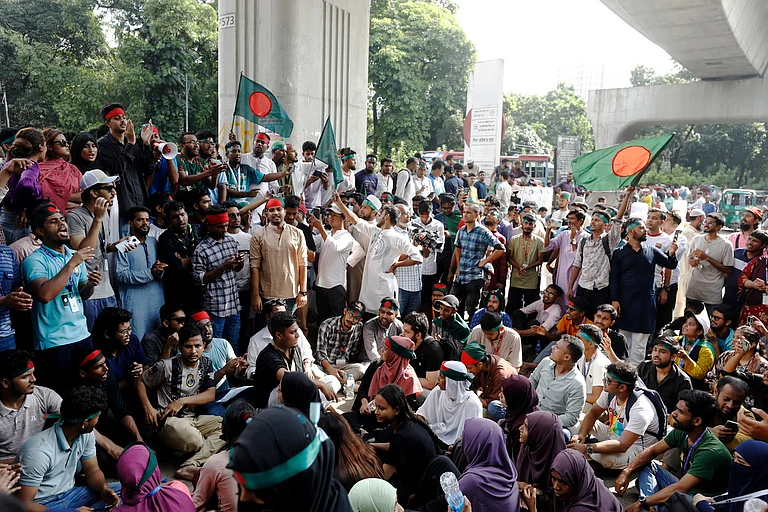One of the memories etched in my mind from the early days of practising law is that of a widowed elderly lady uncontrollably breaking down in the corridors of the court after undergoing the ordeal of witness examination in the trial. It was a hotly contested civil matter, where the brothers had refused inheritance to the widowed sister who had no means and assets of her own. The personal histories of women have always served as powerful catalysts for social transformation in terms of the enactment of progressive legislation, the adoption of welfare-oriented policies or the rendition of judicial pronouncements.
"One Daughter = 10 Sons": Kerala High Court Rules Hindu Women Entitled To Equal Property Share
In a historic judgement, the Kerala High Court says that Hindu daughters are entitled to equal share in ancestral property.
Women have undoubtedly driven such change, be it the sacrifice of the lone woman in Nangeli, which resulted in the abolition of the Breast Tax in Kerala in 1924, or the plight of Bhanwari Devi that paved way for the Vishaka guidelines for the protection of women at the workplace or the landmark judgement in Mary Roy vs State of Kerala, where the Supreme Court, in the exercise of powers under Article 32 of the Constitution, held that the Travancore Christian Succession Act stood repealed with effect from 1951. Subsequently, Syrian Christian women were declared entitled to equal share in intestate succession as men with retrospective effect from 1951, under the Indian Succession Act, 1925.
While celebrating a landmark judicial pronouncement of the Kerala High Court on July 7, 2025, in N. P. Rajani vs Radha Nambidi Parambath on the succession rights of Hindu women—a watershed moment in India’s gender jurisprudence and equality—it will be hard to forget those countless women and daughters, their tears and helplessness, their courage and grit, who, by fate or by choice, had to resort to the corridors of the courts to seek justice and enforce their legal rights. Their journeys were rarely easy. Seeking legal recourse would have meant facing opposition from entrenched patriarchal norms, and in the process, invariably impeding, as respondents, their closest family members, siblings or even parents. In doing so, they would have had to endure social ostracisation, ridicule, stigma and emotional trauma.
While the Constitution has remained unequivocal on equality and equal rights before law, it would be relevant to understand a brief backdrop of succession rights, particularly in the context of the case. While the major part of the country followed the Mitakshara Law—where daughters are not entitled to any right by birth on ancestral property—a large population of Kerala belonging to certain communities have been following a system of law called the Marumakkathayam law—the characteristic feature of which is that the descent is traced in the female line. That system of law was a body of customs and usages which received judicial recognition.
In pursuance to the Directive Principles of State Policy contained in Article 44 of the Constitution, Parliament passed the Hindu Succession Act, 1956, which modified the law of succession in certain respects—to the effect that devolution of interest in property by testamentary or intestate succession, as the case may be, shall be under Hindu Succession Act and not according to the Marumakkathayam law. Subsequently, under the provisions of the Kerala Joint Family Abolition Act, 1975, there was a repeal of the residuary and customary principles of the Marumakkathayam law.
The other significant changes of this statute were “birth in the family of an ancestor shall not give right to claim any interest in any property of such ancestor during his or her lifetime (Section 3)” and “joint tenancy was replaced to tenancy in common in respect of coparcenary { joint heirship} property held by members of HUF {Hindu Undivided Family} governed by Mitakshara law (Section 4)”.
The Hindu Succession (Amendment) Act, 2005, introduced a radical change that “in a Joint Hindu family governed by the Mitakshara law, the daughter of a coparcener shall by birth become a coparcener in her own right in the same manner as the son on and from the appointed date as 20.12.2004”. Despite this, a larger part of the country has continued to deny daughters the right to property by custom and practice.
In the case of N. P. Rajani, the issue that came up before the court was a peculiar situation wherein the Kerala Joint Hindu Family System (Abolition) Act, 1975, stood in the way of a daughter claiming the benefit of the Hindu Succession (Amendment) Act, 2005. It was contended by the plaintiffs/ daughters that after the Hindu Succession (Amendment) Act, 2005, the plaintiffs being the daughters of the deceased first defendant (father) are also entitled to equal share in the plaint schedule property. It was pleaded that though the first defendant (father) had executed a will, he does not have a right to bequeath the properties in favour of the third defendant son.
Thus, it was argued that the will is valid only to the extent of the share the first defendant (father) inherited over the ancestral property, which was allotted to him as per the registered partition deed. One of the defences put up by the respondents was that since the plaintiffs (daughters) were married away by spending the first defendant’s own money, they were not entitled for partition.
This, we may recall for the purposes of discussion here, has been the longstanding argument and reasoning in the major part of the country that followed the Mitakshara law to deny succession rights to daughters. This flawed reasoning was unquestioningly accepted by the daughters for generations as inherited truth cloaked in loyalty. It was also contended by the respondents that the Hindu Succession (Amendment) Act, 2005, will not apply to the State of Kerala since there is no joint family in the state consequent to the promulgation of the Kerala Joint Hindu Family System (Abolition) Act, 1975, and that the Hindu Succession (Amendment) Act, 2005, cannot be interpreted in a manner, undoing the effects of the state’s enactment.
It would also be pertinent to note that the trial court had held the will to be genuine. In the first appeal, filed by the plaintiffs, the court passed a preliminary decree for partition allocating the plaintiffs 1/12th share each in one of the schedules of the property. Aggrieved by this, the plaintiffs approached the High Court of Kerala.
The High Court, while examining the issue, deemed it appropriate to look into the motion for consideration of the Hindu Succession (Amendment) Bill, 2005, tabled before the 14th Lok Sabha on August 29, 2005, wherein the Minister for Law and Justice stated before Parliament that by the Hindu Succession (Amendment) Bill, 2005, Parliament intended to amend Section 6 to enable devolution of interest in coparcenary property to the daughters, both married and unmarried.
Upon detailed consideration of the arguments advanced by both sides as well as the assistance rendered by the amicus curiae (friend of the court), the court arrived at a conclusion that Section 3 and Section 4 of the Kerala Joint Hindu Family System (Abolition) Act, 1975, are repugnant to Section 6 of the Hindu Succession (Amendment) Act, 2005, and thus cannot have any effect. It was also further held that on and from the commencement of the Hindu Succession (Amendment Act), 2005, the daughter of a Hindu who dies after December 20, 2004, in the State of Kerala is entitled to equal share in the ancestral property, subject to the exceptions provided in the Act.
The judgement, in its opening, quotes ‘Skanda purana’ Chapter 23, Verse 46, which depicts the importance of a daughter in our society and says, “One daughter is equal to ten sons. Whatever phala (merits, good results) a person attains by siring and upbringing ten sons, the same phala is attained by begetting a single daughter’ and goes on to say that this statement, however, does not always stand as a true reflection of a daughter’s right when it comes to the right of inheritance to her father’s property.
This judgement is not another legal victory but is a tribute to the courage and perseverance of countless women who languished in the corridors of court, undergoing trial by fire for what was rightfully theirs, and perhaps also a salute to those women who quietly chose to reconcile with lost battles to make peace within the family. While the judgement throws up larger questions about those cases wherein the rights under the Hindu Succession (Amendment Act), 2005, may have been denied to daughters on one ground or another, or how the law on succession would require amendments to address inclusivity in definitions from the perspective of transgender rights, it also remains a fact that much of the deprivation suffered by women and marginalised identities mostly stems from a lack of awareness about legal rights, and this points to an urgent need of accessible legal literacy. That would be one way of bridging the gap between legal rights and lived justice.
(Views expressed are personal)
Smitha Sehgal is a poet and legal professional.
Tags


